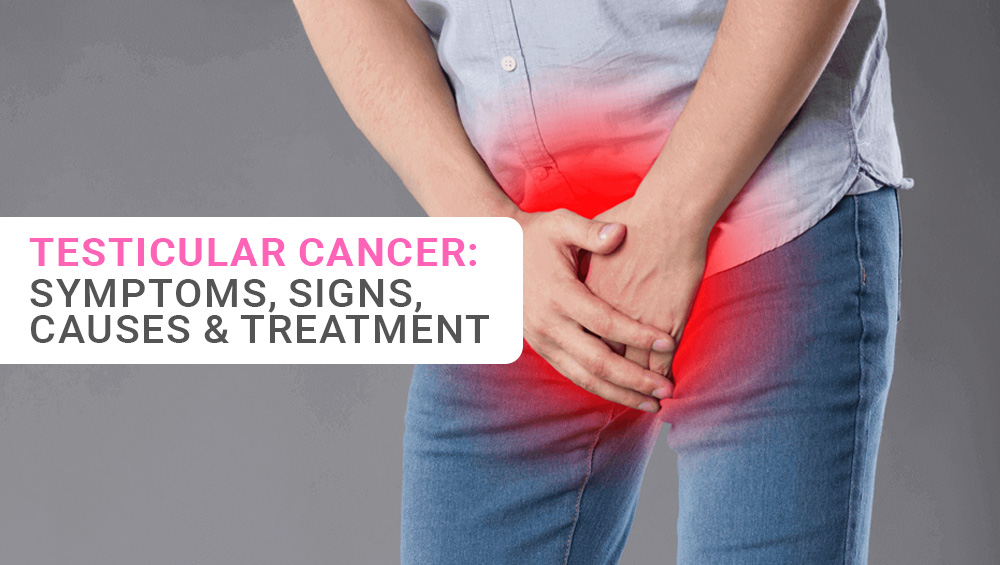Testicular cancer is not a very common type of cancer but is considered as one of the most frequent cancerous diseases among young and middle-aged men, aged between 15-45. The male organs produce the male hormones and sperm and this starts off in the testicles (testes). Testicular cancer is easily treatable, especially when noted early, and even at a later stage of progression. Acquiring knowledge about the early cases of testicular cancer and their symptoms, risk factors, and treatment options can even the difference.
What is Testicular Cancer?
Testicular cancer occurs when abnormal cells in the testicles grow uncontrollably. It normally begins in the germ cells, which are those that produce sperm. The germ cell tumors are of two types mainly:
-
Seminomas -They grow at a slow rate and are radiation therapy sensitive.
-
Non seminomas- These are more likely to grow and develop faster.
They both respond to treatment especially when they are diagnosed at the early stages.
Symptoms and Signs Of Testicular Cancer
Being able to know the signs of testicular cancer early may lead to early diagnosis and help in offering timely treatment. Men, as a rule, are recommended to make self-examinations of their testicles at least once in a month to discover anomalies.
Common Testicular Cancer Symptoms Include:-
-
Lump or swelling in the testicle – In general, it’s pain-free and the most common and significant sign.
-
Sensation of weight and fullness in the scrotum
-
Vague pain in the lower abdomen or groin
-
Acute accumulation of fluid in the scrotum
-
Pain/ache in testicle/sack or in the scrotum
-
Increase in or tenderness of the breasts (gynecomastia) resulting from hormonal changes
-
Pain: Pain in the back – when cancer spreads to the lymph nodes.
These symptoms may not mean cancer, but you should never ignore them. Any alterations in the testicles need to be evaluated by a doctor.
What Causes Testicular Cancer?
The precise origin of testicular cancer remains unfamiliar. Yet, there are also a number of risk factors that can cause the emergence of the disease:
1. Undescended Testicle (Cryptorchidism):
Male whose testicles did not descend normally during birth are at greater danger.
2. Family History:
Becoming affected is more likely should you have a father or brother with testicular cancer.
3. Age:
Majority of the cases affect men aged between 15 and 45.
4. Race and Ethnicity:
The Caucasian men are prone to testicular cancer than those of African or Asian descent.
5. Personal History:
Guys who develop testicular cancer in one testicle are at threat of getting it in the other.
What are the Ways of Diagnosing Testicular Cancer?
Early identification is the most important point in treatment. In case a patient will have symptoms or abnormalities, further tests can be prescribed as the following:
-
Scrotal Ultrasound: An exteriorized portion of the scrotum to see the interiors and also to see the masses.
-
Blood Tests: To determine the presence of tumor markers such as AFP (alpha-fetoprotein), hCG (human chorionic gonadotropin) and LDH (lactate dehydrogenase).
-
CT Scan: To check whether the cancer has spread into lymph nodes or other organs.
-
Inguinal Orchiectomy (removal of testicle surgically): It is usually performed to establish the diagnosis and prevent the spreading.
Treatment For Testicular Cancer
Owing to the ever-rising cost of treatment of testicular cancer, most patients do not take proper measures to prevent the disease once it has been diagnosed.
The therapy of testicular cancer is dependent on the type, stage and the general health of the patient. Even cases that are diagnosed late are quite treatable.
1. Surgery
Orchiectomy: The affected testicle is removed in a small incision which is made on the groin.
Retroperitoneal Lymph Node Dissection (RPLND): Depending on the scenario, adjacent lymph nodes can also be taken out.
2. Radiation Therapy
Traditionally applied to seminomas.
Attacks the cancer cells spreading in the lymph nodes or other parts where the cancer may have been distributed.
3. Chemotherapy
Has efficacy in the treatment of non-seminomas and seminomas.
Usually prescribed when the disease is in the late stages or in case the cancer attacks past the testicle.
4. Surveillance
Active monitoring follows initial surgery without any additional treatment in the case of selected low-risk patients.
Fertility and Psychology
Young-onset(testes) cancer may be emotionally hurtful. It may also have an influence on fertility. Sperm banking patients should discuss before having their chemotherapy or radiations. The wellbeing levels and emotional support needed to cope with the disease and therapy cannot be overstated as well.
Survival Rates and Prognosis
Due to better treatment and early diagnosis, the survival of testicular cancer is extremely high. When diagnosed early, there is a 5-year survival rate higher than 95 percent. It is even likely to treat even metastatic cases aggressively.
Summing up: Quality Testicular Cancer Treatment in Gurgaon
Although a diagnosis of testicular cancer may be frightful, it has a highly positive prognosis given the suitable therapy and management. Several people have responded positively to the excellent results created by Dr. Pooja Babbar, the best medical oncologist in Gurgaon, when trying to obtain expert advice. With 15+ years of experience in treating various types of cancers, including testicular cancer, Dr. Babbar combines professional expertise with a humanistic approach.
With her, many patients have not only managed to fight the disease but even lived to lead cancer-free lives. She establishes individualized case management, compliance with international standards, and a patient-centered approach, which explains her reputation as a reputable name in the field of oncology.
In case you or someone you know is showing the symptoms of testicular cancer, do not hesitate, early intervention can preserve life. Visit Dr. Pooja Babbar to make the correct diagnosis and get treatment in time and care.














